Freedom of expression, speech are not absolute rights, says Comelec

Personnel of Oplan Baklas take down an oversized billboard of a candidate. Image from Comelec / Facebook
MANILA, Philippines — Freedom is not absolute, and on this argument Commission on Elections (Comelec) spokesperson James Jimenez anchored the legality of the actions of Oplan Baklas in taking down election and campaign materials even in private places.
Jimenez made the remark after ‘Oplan Baklas’ was met with backlash after authorities took down campaign materials displayed by non-candidates in their private properties — a move criticized for stepping on the freedom of expression and speech of non-candidates, while some critics decry trespassing.
“Neither freedom of expression or freedom of speech are absolute rights. In the proper circumstances, under the proper conditions, they can be regulated without constitutional insult and we believe that very firmly,” Jimenez said in an interview with ABS-CBN News Channel.
Jimenez argued that the Supreme Court has made a distinction in the treatment of advocacies and treatment of declarative statements in support of a particular candidate.
“Also, we understand that at least one Supreme Court decision, a distinction was made between simple declarative statements of you know, ‘Vote for someone versus statements of advocacy.’ The difference between the treatment of those two categories of speech was made very clear and we respect those those distinctions,” Jimenez said.
“But even the Supreme Court says that when all you’re doing is endorsing a candidate, you have to accept certain restrictions on your right,” he added.
Lawful election propaganda
Section 3 of Republic Act No. 9006 detailed what is considered as lawful election propaganda, which includes “cloth, paper or cardboard posters, whether framed or posted, with an area not exceeding two feet by three feet.”
Section 9 of the same law stated that candidates may post any lawful propaganda material “in private places with the consent of the owner thereof, and in public places or property which shall be allocated equitably and impartially among the candidates.”
Meanwhile, Section 7 of Comelec Resolution No. 10730 detailed prohibited forms of election propaganda, which includes “to post, display or exhibit any election campaign or propaganda material outside of authorized common poster areas, in public places, or in private properties without the consent of the owner.”
SC ruling
In 2013, the Diocese of Bacolod caught the ire of Comelec for posting “oversized” tarpaulins identifying senatorial candidates and partylist groups as “Team Patay” or “Team Buhay” depending on their stand on the reproductive health law.
Two years later, the Supreme Court ruled in favor of the Diocese of Bacolod saying, “In this case, the size regulation is not unrelated to the suppression of speech.”
“Limiting the maximum sizeof the tarpaulin would render ineffective petitioners’ message and violate their right to exercise freedom of expression,” the Supreme Court said in its ruling.
However, Jimenez insisted that “the Supreme Court did say there is this issue of speech that can be validly, constitutionally regulated.”
“When your speech in general suddenly strays into the area of simple declarative statements, of simple statements of support for a particular candidate, then it becomes regulatable. I think I believe at least that’s the interpretation that we’ve been going by,” Jimenez said.
EDV
READ MORE: 65% of Filipinos believe it’s ‘dangerous’ to publish anything critical of administration — SWS
Disclaimer: The comments uploaded on this site do not necessarily represent or reflect the views of management and owner of Cebudailynews. We reserve the right to exclude comments that we deem to be inconsistent with our editorial standards.
